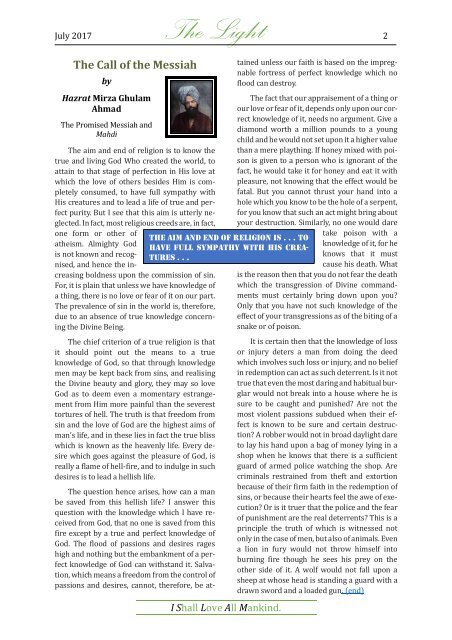2017 07 The Light July 2017
You also want an ePaper? Increase the reach of your titles
YUMPU automatically turns print PDFs into web optimized ePapers that Google loves.
<strong>July</strong> <strong>2017</strong> <strong>The</strong><br />
<strong>Light</strong> 2<br />
<strong>The</strong> Call of the Messiah<br />
by<br />
Hazrat Mirza Ghulam<br />
Ahmad<br />
<strong>The</strong> Promised Messiah and<br />
Mahdi<br />
<strong>The</strong> aim and end of religion is to know the<br />
true and living God Who created the world, to<br />
attain to that stage of perfection in His love at<br />
which the love of others besides Him is completely<br />
consumed, to have full sympathy with<br />
His creatures and to lead a life of true and perfect<br />
purity. But I see that this aim is utterly neglected.<br />
In fact, most religious creeds are, in fact,<br />
one form or other of<br />
atheism. Almighty God<br />
is not known and recognised,<br />
and hence the increasing<br />
boldness upon the commission of sin.<br />
For, it is plain that unless we have knowledge of<br />
a thing, there is no love or fear of it on our part.<br />
<strong>The</strong> prevalence of sin in the world is, therefore,<br />
due to an absence of true knowledge concerning<br />
the Divine Being.<br />
<strong>The</strong> chief criterion of a true religion is that<br />
it should point out the means to a true<br />
knowledge of God, so that through knowledge<br />
men may be kept back from sins, and realising<br />
the Divine beauty and glory, they may so love<br />
God as to deem even a momentary estrangement<br />
from Him more painful than the severest<br />
tortures of hell. <strong>The</strong> truth is that freedom from<br />
sin and the love of God are the highest aims of<br />
man’s life, and in these lies in fact the true bliss<br />
which is known as the heavenly life. Every desire<br />
which goes against the pleasure of God, is<br />
really a flame of hell-fire, and to indulge in such<br />
desires is to lead a hellish life.<br />
<strong>The</strong> aim and end of religion is . . . to<br />
have full sympathy with His creatures<br />
. . .<br />
I Shall Love All Mankind.<br />
<strong>The</strong> question hence arises, how can a man<br />
be saved from this hellish life? I answer this<br />
question with the knowledge which I have received<br />
from God, that no one is saved from this<br />
fire except by a true and perfect knowledge of<br />
God. <strong>The</strong> flood of passions and desires rages<br />
high and nothing but the embankment of a perfect<br />
knowledge of God can withstand it. Salvation,<br />
which means a freedom from the control of<br />
passions and desires, cannot, therefore, be attained<br />
unless our faith is based on the impregnable<br />
fortress of perfect knowledge which no<br />
flood can destroy.<br />
<strong>The</strong> fact that our appraisement of a thing or<br />
our love or fear of it, depends only upon our correct<br />
knowledge of it, needs no argument. Give a<br />
diamond worth a million pounds to a young<br />
child and he would not set upon it a higher value<br />
than a mere plaything. If honey mixed with poison<br />
is given to a person who is ignorant of the<br />
fact, he would take it for honey and eat it with<br />
pleasure, not knowing that the effect would be<br />
fatal. But you cannot thrust your hand into a<br />
hole which you know to be the hole of a serpent,<br />
for you know that such an act might bring about<br />
your destruction. Similarly, no one would dare<br />
take poison with a<br />
knowledge of it, for he<br />
knows that it must<br />
cause his death. What<br />
is the reason then that you do not fear the death<br />
which the transgression of Divine commandments<br />
must certainly bring down upon you?<br />
Only that you have not such knowledge of the<br />
effect of your transgressions as of the biting of a<br />
snake or of poison.<br />
It is certain then that the knowledge of loss<br />
or injury deters a man from doing the deed<br />
which involves such loss or injury, and no belief<br />
in redemption can act as such deterrent. Is it not<br />
true that even the most daring and habitual burglar<br />
would not break into a house where he is<br />
sure to be caught and punished? Are not the<br />
most violent passions subdued when their effect<br />
is known to be sure and certain destruction?<br />
A robber would not in broad daylight dare<br />
to lay his hand upon a bag of money lying in a<br />
shop when he knows that there is a sufficient<br />
guard of armed police watching the shop. Are<br />
criminals restrained from theft and extortion<br />
because of their firm faith in the redemption of<br />
sins, or because their hearts feel the awe of execution?<br />
Or is it truer that the police and the fear<br />
of punishment are the real deterrents? This is a<br />
principle the truth of which is witnessed not<br />
only in the case of men, but also of animals. Even<br />
a lion in fury would not throw himself into<br />
burning fire though he sees his prey on the<br />
other side of it. A wolf would not fall upon a<br />
sheep at whose head is standing a guard with a<br />
drawn sword and a loaded gun. (end)














